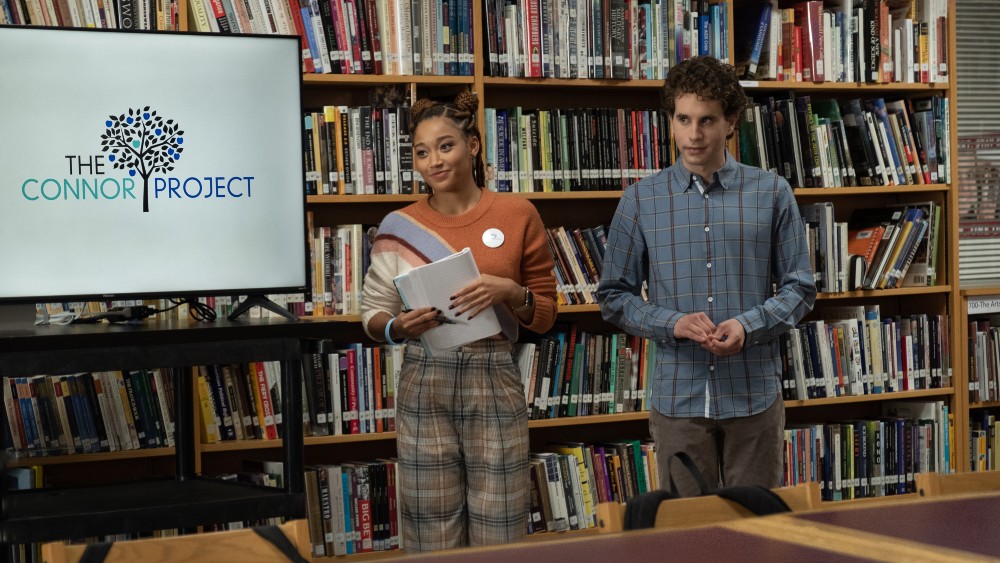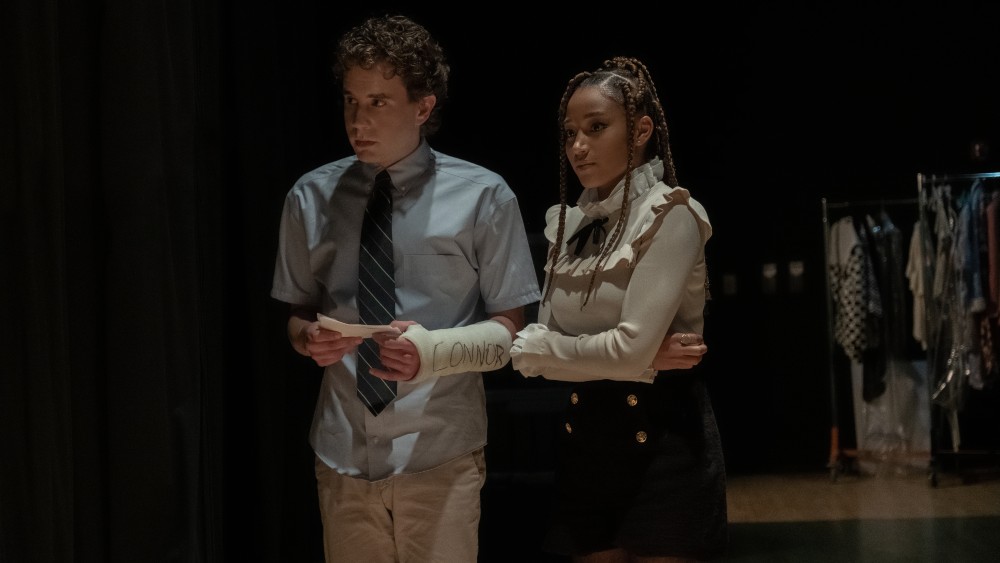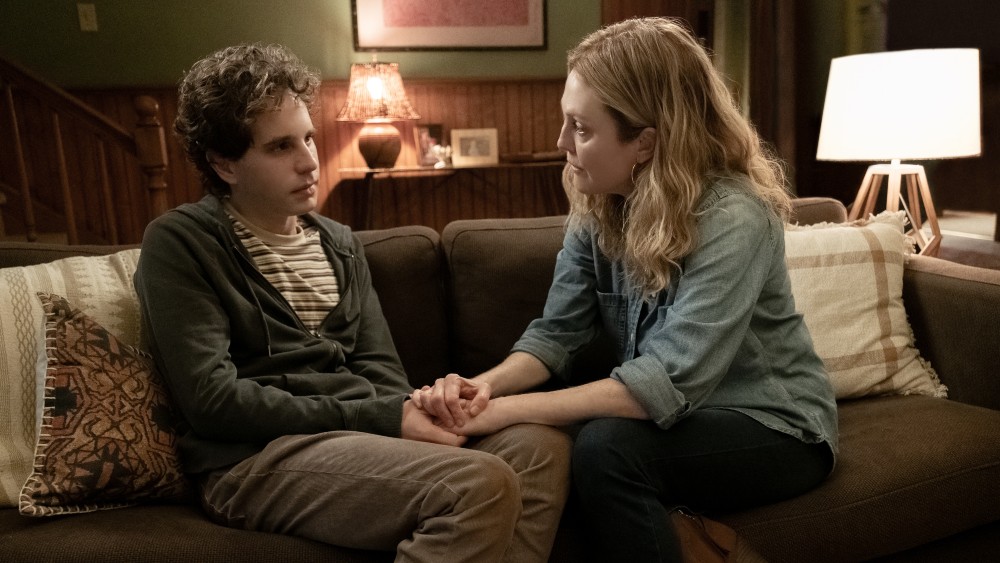
Before they gained movie fame and won an Oscar for writing the songs in La La Land, composing duo Benj Pasek and Justin Paul made Broadway names for themselves with the Tony-winning musical Dear Evan Hansen. Released in 2015, the show won six Tonys, including Best Musical and Best Actor in a Musical for star Ben Platt, perhaps helped by its then-timely subject matter revolving around bullying, teen suicide, and depression.
It is now 2021, however, and the culture has moved on quickly from the story’s difficult-to-swallow message of compassion. Knives out, today’s ethos is likely to find the plot manipulative and even evil. But the Hollywood machine does not move on from adaptations of successful products quite as quickly, leading us to the movie version of Pasek and Paul’s, directed by Stephen Chbosky (The Perks of Being a Wallflower), which landed the opening night gala at this year’s Toronto International Film Festival.

The film version of Dear Evan Hansen features one actor from the original musical (Platt as the titular character) along with some household film name: Julianne Moore plays Evan’s mom Heidi, and Amy Adams plays Cynthia Murphy, the matriarch of a family grieving over the loss of their son. Nik Dodani is Jared, Evan’s sort of semi friend—a “family friend”—as he likes to describe it, Amandla Stenberg is the politically conscious activist student Alana Beck, and Kaitlyn Dever plays Zoe Murphy, Evan’s purported love interest. It is quite a stellar cast that does nearly everything right, but it is unquestionably Platt’s over-the-top performance, adapted almost identically from his role on Broadway, that demands the most attention.
Plot-wise, Dear Evan Hansen hews quite closely to the outline of the original, which is perhaps not surprising as the script here is by Steven Levenson, who wrote the book for the Broadway production. In broad strokes, the tale revolves around a shaky, unpopular, tremendously insecure teenager that finds himself caught in a web of lies and deceit—first the product of an unfortunate misunderstanding, then of his own doing. The confusion and, later, Evan’s deceitfulness ingratiate himself to the Murphy family, grieving the loss of a child. As the movie progresses, the guile has other payoffs, including newfound social media fame for the previously bullied, unwanted Evan.

The most magical part of this musical and, now, the film, has always been the powerful, emotive Pasek/Paul songs. The duo can put together a catchy tune with mostly sophisticated lyrics better than anyone, and their work scarcely needs any introduction. Chbosky and Levenson are smart enough to know which of the original songs are the most popular and which can go. They make the correct if expected choices to keep Waving Through a Window, For Forever, Sincerely Me, and, of course You Will be Found, as the centerpieces of the adaptation.
The biggest difference between the Broadway and the big screen versions of a story tends to reside in the latter’s ability to edit shots and direct your focus to particular characters, as well as to increase the variance of its landscapes. In Dear Evan Hansen the movie, Editor Anne McCabe finds a decent enough balance between schizophrenic editing and theater-stage passivity. Her best work comes during the songs, where she picks up the speed and changes the pace, following the music’s crescendo. Her works helps the already highly-effective songs achieve a full, smooth transition into film. Sets-wise, by contrast, the movie version is less ambitious, centering almost every take in simple high school hallways, in the somewhat shabby Hanson home, or in the more luscious Murphy one. Chbosky is clearly disinterested in adding pomp and circumstances to the makeup, decorations, or effects that did not exist in the musical, wisely preferring to let the song and dance due the bulk of the work here.
Which brings us to the aspect of this product—play or film—that has always proven to be the most controversial. Is Levenson asking audiences to celebrate a character who tells an unforgivable lie, causing significant pain and grief to many innocent people? Not in this critic’s view, but each person’s mileage will surely vary. For me, Dear Evan Hansen has always been a profoundly sad tearjerker about senseless loss, misunderstood misfits, and social anxiety revolving around wanting to belong. Evan has close to no social skills, the product of a broken home and a broken culture, buttressed by the inherent cruelty of social media on a teenager’s psyche. Some may find distasteful that Evan is seen to set out into the sunset, despite his foibles. But Evan’s depression—as cast through his psychiatrist’s command that he write daily letters to himself with the preface “Dear Evan Hansen”—has not gone away. There is an uplifting mood to the middle of the story, but it remains tragic and pitiful nonetheless.

And the film version is greatly aided by a set of phenomenal performances. Platt was born to play this role and though his exaggerated, meant-for-the-theater mannerisms seem too much at times with camera close-ups, his is nonetheless a guttural, passionate performance. The Oscar-winning Julianne Moore, meanwhile, provides an understated bur incredibly powerful rendition of her late-breaking song, one that left no dry eye in the auditorium. Amy Adams is similarly, perfectly cast as the mother who refuses to hear the truth and grieves in her own fantastical ways. The complex themes of Dear Evan Hansen—about the difficulties of child-rearing, grieving in loss, family cohesion, and others—are well-served by the reddened eyes of the film’s stars.
Make no mistake about it, the film adaptation of Broadway hits is most likely quite dead for the time being, if this year’s greatest post-COVID misfire, In the Heights, is any indication. If that film, which hits all the notes that are still relevant to the dominating body politic today could not escape box office hell, one is hard-pressed to imagine that the much more challenging, much more difficult Dear Evan Hansen will. But lack of ticket sales should not be confused with lack of quality. This is and always has been a resonant tale of sadness, lifted with a sentimental tone of music. It will not lift your spirits, Broadway song and dance style, but it will surely move them.
Grade: B+
Dear Evan Hansen opened the Toronto International Film Festival last week, and it will be released in U.S. theaters on Sept. 24.
All photos courtesy Universal Picture.





